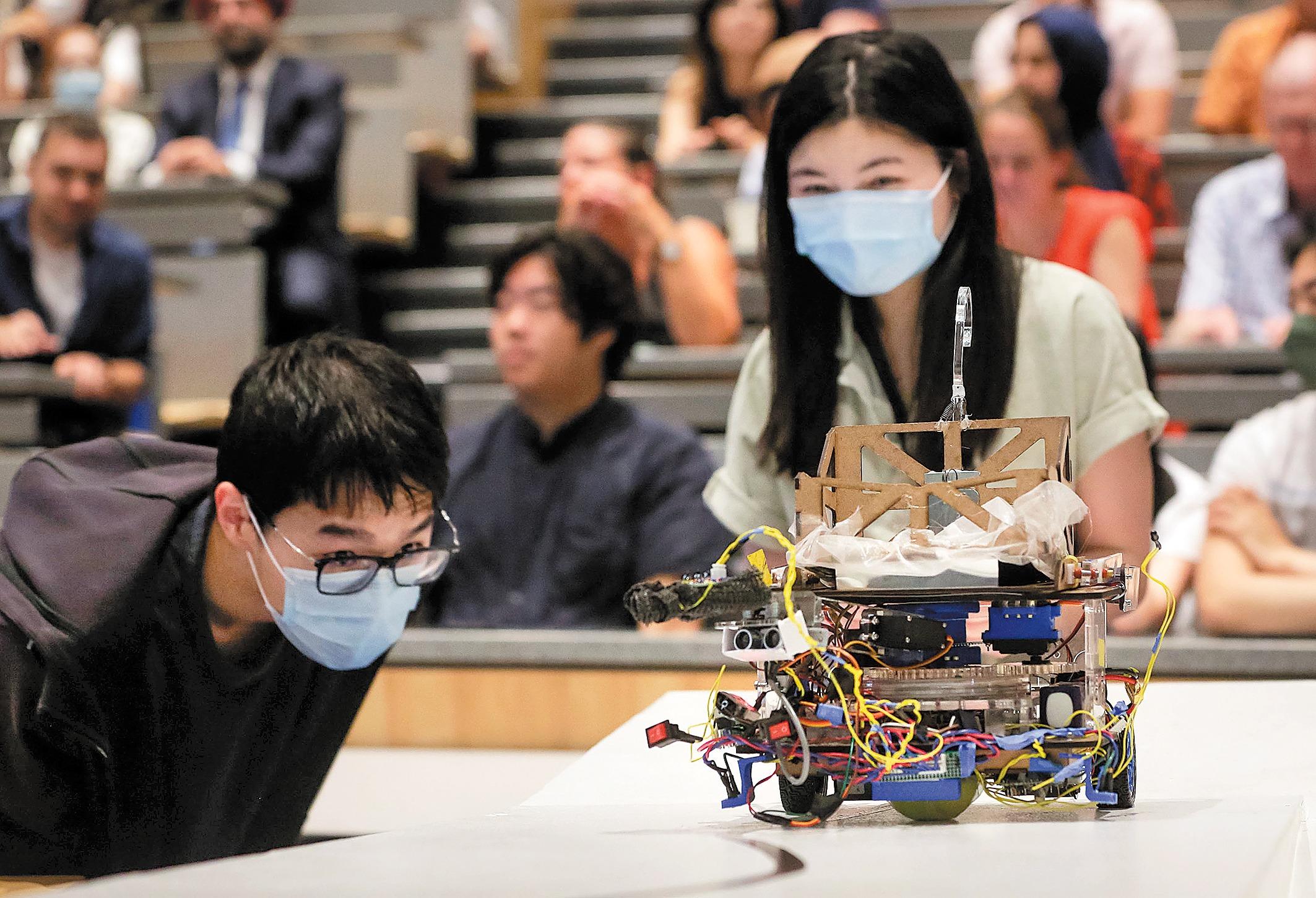Gun violence, civil unrest influence decisions on education abroad
 International students arrive at Kwansei Gakuin University in Nishinomiyia, Japan, in September. (PHOTO /THE YOMIURI SHIMBU)
International students arrive at Kwansei Gakuin University in Nishinomiyia, Japan, in September. (PHOTO /THE YOMIURI SHIMBU)
He Yijing, a sophomore student, was sitting in a campus hallway at Zhejiang University of Finance and Economics in Hangzhou, capital of Zhejiang province, on Nov 9, 2021, when she learned that a 24-year-old Chinese graduate student from the University of Chicago had been fatally shot.
Studying English for her upcoming Graduate Record Examination, a standard requirement for entry to graduate schools in the United States, He said she was deeply shocked by the death of Zheng Shaoxiong, who was killed during a robbery near his university campus.
I feel that the cumulative weight of deteriorating US-China relations has definitely caused more parents and potential students in China to question whether the US is a hospitable place.
John Quelch, dean of the University of Miami Herbert Business School in Florida, US
Zheng was studying statistics in Chicago, and He's studies at the time were also related to statistics. "I was so sorry to hear about his death," said He, who later became one of many Chinese international students who changed their plans to study in the US.
Last year, some 290,000 Chinese students were studying in the US, an 8.6 percent decline from the previous year, data from the Institute of International Education, or IIE, show. In contrast, the number of Indian students in the US stood at about 200,000 last year, a 19 percent rise compared with the previous year.
The allure of the American dream appears to be fading for many Chinese students.
In 2015, some 51 percent of Chinese students expressed a desire to study in the US, but by last year, the proportion had fallen to 30 percent, surveys by Chinese education company New Oriental Education& Technology Group show, along with data gathered by The Wall Street Journal.
Increasing gun violence is one of the reasons international students, including those from China, are choosing not to study in the US.
In 2018, an IIE survey found that about 44 percent of international applicants for the 2017-18 academic year said they were primarily concerned about their safety when deciding whether to study in the US. They were particularly worried about gun violence and civil unrest.
"With news of shootings every day, I find it really frightening," said He, who chose to study in Hong Kong, rather than the US.
 Chinese students at Moscow State University perform a dance during Spring Festival in February. Many Chinese students have chosen destinations other than the US for their overseas studies. (PHOTO / CHINA NEWS SERVICE)
Chinese students at Moscow State University perform a dance during Spring Festival in February. Many Chinese students have chosen destinations other than the US for their overseas studies. (PHOTO / CHINA NEWS SERVICE)
She added that she knows a former classmate who is an undergraduate studying in the US.Occasionally, warnings from the university appear in the students' email inboxes, informing them about specific areas on campus where bombs have been detected.
Data show that the decline in international student enrollment could affect US universities and the economy.
Due to their international status, these students often pay higher tuition fees, making many US institutions reliant on these revenue streams.
CNN quoted NAFSA, or the Association of International Educators — an international alliance of professional educators — as saying the decline in international student enrollment has resulted in an estimated loss of $11.8 billion to the US economy, along with more than 65,000 jobs.
China has been the top country of origin for international students for more than a decade, with some 31 percent of such students in the US coming from China, the IIE said.
Chinese students have been a major source of revenue for many US universities and colleges, contributing a substantial amount to the US economy.
In 2018 alone, they brought in$14.9 billion, primarily through tuition fees and living expenses, the US Department of Commerce reported.
 Students compete in a robot design contest at the University of British Columbia in Vancouver, Canada, in August. (PHOTO / XINHUA)
Students compete in a robot design contest at the University of British Columbia in Vancouver, Canada, in August. (PHOTO / XINHUA)
Skilled labor
Data also show a decline in the number of international students studying sciences, particularly those from China, which affects the US in terms of attracting high-tech talent.
Around half of the 1 million international students in the US are enrolled in STEM programs, which encompass science, technology, engineering and mathematics.
These programs typically bring highly skilled labor to the US job market. In 2019, international students accounted for nearly half master's and doctoral STEM degrees awarded, the National Center for Education Statistics reported.
Among the immigrant STEM workers choosing to remain and work in the US, most of them come from China or India, data from the American Immigration Council show.
As a STEM student, He said the US is an ideal country to study in.
"Master's degrees in the US are better recognized internationally. The US is known for its advancements in science and technology. In the field of data science particularly, it is considered to be at the forefront," He said.
"When I initially entered college, data science programs were already established in the US. At that time in China, no graduate-level data science programs were available. It also seemed easier to find job opportunities in the US after completing a data science degree. I believed that the US would give me better prospects. Therefore, I was determined to go there."
However, it is increasingly challenging for Chinese students and scholars, particularly those studying STEM fields, to remain in the US.
A ban implemented by then-US President Donald Trump in 2020 restricts the entry of graduate students from certain Chinese universities believed to have connections with the Chinese military. Many of them are STEM students, and the ban is still in effect under the Biden administration.
Last year, the US Justice Department ended its China Initiative, following calls by academic and civil rights groups. The initiative was criticized for impeding academic collaboration and contributing to anti-Asian bias.
 Staff members promote Canadian universities and colleges at an education fair in Beijing in February. (WANG ZHUANGFEI / CHINA DAILY)
Staff members promote Canadian universities and colleges at an education fair in Beijing in February. (WANG ZHUANGFEI / CHINA DAILY)
The Organisation for Economic Co operation and Development, or OECD, an intergovernmental grouping comprising 38 member countries, said new data show that the US is losing the competition for scientific talent to China and other nations.
In 2021, the US lost published research scientists to other countries, while China gained more than 2,400 scientific authors, data published in April by the OECD revealed. This marks a reversal from as recently as 2017, when the US gained 4,292 scientists, while China attracted only 116.
As a student in the field of data science and computer science, He said China's economic development in recent years made her realize there are more opportunities at home, and that staying in China for her professional growth is a viable option.
"China is developing rapidly, and the country offers great potential," He said.
She said she chose to study in Hong Kong rather than the US as she saw further development prospects in that city and the Chinese mainland, especially with the support of policies implemented in the Guangdong — Hong Kong-Macao Greater Bay Area.
Meanwhile, rising anti-Asian racism and the deterioration of China-US relations are prompting Chinese students to seek higher education elsewhere.
In Florida, the University of Miami Herbert Business School saw a 30 percent drop in Chinese graduate students last year. The school is ranked No 1 in that state and 26th globally for business administration based on the 2021 World University Rankings.
John Quelch, dean of the business school, said last year, "At the peak maybe four years ago, we had as many as 300 Chinese students. "Last year, the university had about 140 students from China.
"The decision to go to graduate school is usually one year, and sometimes two, in the making. People do not decide on a Friday and then go on a Monday," Quelch said.
"I feel that the cumulative weight of deteriorating US-China relations has definitely caused more parents and potential students in China to question whether the US is a hospitable place."
 Malaysian higher education institutions promote their programs at a fair in Beijing in April. (DU JIANPO / FOR CHINA DAILY)
Malaysian higher education institutions promote their programs at a fair in Beijing in April. (DU JIANPO / FOR CHINA DAILY)
Permission needed
Under a recently enacted law signed by Florida Governor Ron DeSantis, public colleges in the state are required to obtain permission from a higher education governing board before engaging in collaboration with or accepting grants from specific countries, including China.
Florida also prohibits state colleges and universities from entering into any agreements or partnerships with foreign institutions without proper authorization.
In Ohio, lawmakers introduced a bill in March that aims to ban all formal relationships between that state's public higher education system and academic institutions in China.
In Texas the same month, lawmakers introduced a bill that would ban students from China and three other countries from being admitted to public colleges and universities in the state.
"As there is discrimination against Chinese Americans in the US, it might be better to go elsewhere for a different experience," He said.
The COVID-19 pandemic not only significantly reduced enrollment rates among Chinese international students in the past year, but also led to many individuals altering their life plans even after the number of cases subsided.
A report last year by The Wall Street Journal said that during the first half of 2022, the number of US student visas issued to Chinese nationals fell by more than 50 percent compared with pre-pandemic levels.
However, the recruitment of Chinese students had been faltering in the three academic years before the pandemic emerged. For example, IIE data show that while the 2012-13 academic year saw a more than 21 percent rise in Chinese students, the uptick in 2019-20 was less than 1 percent.
Some Chinese students were reluctant to travel far from home during the pandemic. As a result, Asian destinations such as Hong Kong and Singapore emerged as popular study choices for these students.
"When I was deciding whether to go to the US, my main focus was on career development. However, spending several months at home during the pandemic made me realize the importance of family bonds," He said.
Her mother disagreed with He's plans to work in the US. The pandemic also prompted He to consider the potential impact on her parents' retirement if they remained at home while she pursued opportunities in the US.
"I must consider my parents. Instead of having a dispute with them at some point in the future, I can just fix the problem in the first place," He said. "Anyway, the US is not the only option available."
 Visitors to an expo in Beijing are attracted to the booths of Hong Kong educational institutions. (DU JIANPO / FOR CHINA DAILY)
Visitors to an expo in Beijing are attracted to the booths of Hong Kong educational institutions. (DU JIANPO / FOR CHINA DAILY)
She is not alone in thinking that way, as many universities outside the US are seeing a rise in Chinese student enrollment.
A study last year by New Oriental, a comprehensive education and training institution, found that interest among Chinese students in studying in the US had been declining since 2017, even as overall Chinese interest in studying abroad surged.
More students are now expressing an interest in going to the United Kingdom, rather than the US, while interest in Hong Kong and Singapore is climbing steadily, the report said.
In 2015, about 8 percent of students from the Chinese mainland expressed a desire to study in Hong Kong, but by last year, the proportion had risen to 19 percent. In 2015, only 6 percent of Chinese students said they were interested in studying in Singapore, but the proportion rose to 14 percent last year, the report said.
Canada has seen a rise in the number of Chinese students studying in the country.
Data from Axios show Chinese student enrollment at the University of Toronto has risen every year for the past decade. Some 15,700 Chinese students were studying at this institution for the 2022-23 academic year, up from about 6,000 in 2013-14.
In 2021-22, the UK saw the highest influx of Chinese students — more than 150,000 — compared with any other country. This marked a rise of 41 percent, or 44,475 students, from 2017-18 to 2021-22, data from the Higher Education Statistics Agency, which is based in the UK, show.
Now 23, He is studying data science and analytics at The Hong Kong Polytechnic University and is preparing to start her second master's program in computer science at The University of Hong Kong in the autumn.
She said she would choose Hong Kong over the US for her studies again if given the opportunity.


